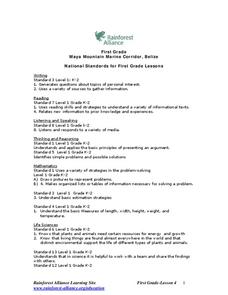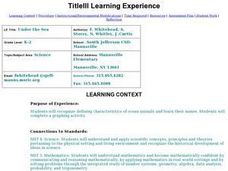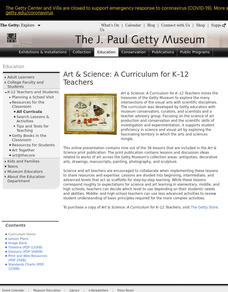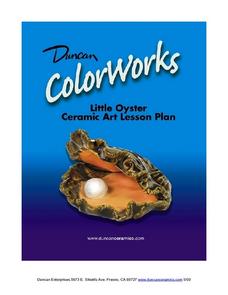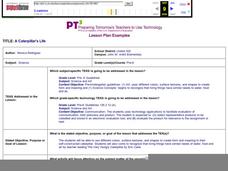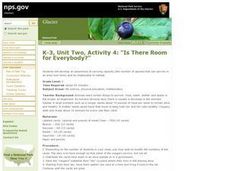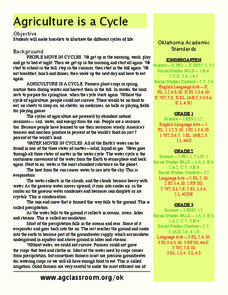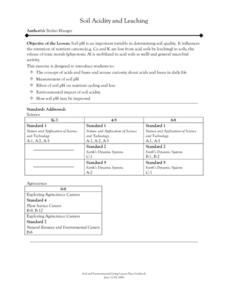Curated OER
The Life Cycle of the Butterfly
Students examine the life of a butterfly. They write a biography from the point of view of a caterpillar using new vocabulary. They use magnifying glasses to examine butterflies and caterpillars.
Curated OER
The Magic School Bus Goes to Mussel Beach
Students participate in a hands-on activity where they explore tidal zones. They explore tides and marine life. This is an experiment that can be accomplished in class.
Curated OER
Who Takes Care of the Maya Forest Corridor?
First graders study the animals in the Maya Forest Reserve. In this conservation lesson, 1st graders create a graph to compare the environment of animals to their own. They design a 3D model of these two environments.
Curated OER
Under the Sea - Ocean Mammals/Fish
Learners explore the similarities and differences between ocean mammals and fish. The characteristics of the life forms observed are placed onto a graph. The classroom becomes the botom of the sea and is explored to gain the required data.
Curated OER
Marshland Ecosystems
Young scholars identify animals in ecosystem depicted on 16th Century ceramic basin and classify them as herbivores, carnivores, or omnivores based on physical characteristics and prior knowledge, determine which life forms in ecosystem...
Curated OER
What Plants Need in Order to Survive and Grow: Soil
Students conduct an experiment to evaluate whether plants need soil to survive and grow. They plant two seeds, one with soil and one without, make predictions, and record and analyze the seed germination results on a worksheet.
Curated OER
Clearly Classified
Young scholars review the classification system for living organisms and apply it the classification of insects and flowers in the still life by Ambrosius Bosschaert. They create a chart classifying the animals and plants in the painting...
Curated OER
The Mystery of the Missing Hummingbirds
Students record scientific observations in a science journal. In this season activity, students make observations about each of the seasons and record in their journals. Students record organisms response to seasonal changes...
Curated OER
Oil on the Beach
Students explore how oil pollutes the oceans. In this science lesson plan, students investigate various materials that could be used to clean up an oil spill. Students discuss which materials worked best and how humans can reduce oil...
SeaWorld
Animal Migrations
Here is a fabulous set of activities for your young scientists. Each lesson contains map, hands-on, and game activities that will help the class understand why and how animals migrate from one place to another. First they'll examine the...
Curated OER
Animal Coverings
Young scholars compare and contrast the types of coverings found on animals. They identify a wide variety of animals in a museum room. They classify animals based on their coverings as well.
Curated OER
Are You One Of Us?
Young scholars discover how to classify things based on their similarities and differences. Students give the characteristics of insects and create a classification list. Given examples of various types of insects, young scholars...
Curated OER
Little Oyster: Ceramic Lesson
Children will love researching and then creating a bottom dwelling mollusk of their own. They watch clips describing the ocean ecosystem and how oysters fit into their environment. Next, they research what oysters eat and how they look....
Curated OER
Water Cycle and Ecosystems
Students explore the water cycle. In this investigative lesson, students examine the water cycle process. They will record their observations and discuss marine and freshwater ecosystems.
Curated OER
A Caterpillar's Life
Students use different colors, surface textures, and shapes to create form and meaning to their caterpillar. They also come to recognize that living things have similar needs of water, food and air by teacher reading The Very Hungry...
Curated OER
Butterfly Metamorphosis
Students study butterfly metamorphosis. In this science lesson, students read "The Very Hungry Caterpillar" and create a model of butterfly metamorphosis. Students write a paragraph about the process.
Curated OER
Birth, Growth, And Development
Students understand that all living things have a life cycle that includes being born, developing into an adult, reproducing, and eventually dying.
Curated OER
Johannes Gutenberg and the Printing Press
Young scholars use library or online resources to create time lines on the life of Johannes Gutenberg and tell the impact his invention, the printing press, had on the development of newspapers.
Curated OER
Habitat is Home
Students complete a picture to show things found in their homes. In this habitat lesson, students discuss and make a class picture of an animal habitat and its four basic needs. Students sing a song. Students create their own...
Curated OER
Is There Room for Everybody?
Third graders examine the capacity of animals able to live in one habitat. In this habitat lesson, 3rd graders play a game that shows the food chain and the interactions between animals in an area. Students discover that food is a major...
Curated OER
Disguise for the Eyes
Young scientists discover how many, many animals use color as a way of helping them to survive in the wild. They understand how animals use color in their everyday lives. Pupils engage in hands-on activities, watch videos, access...
American Society for Microbiology
”Build a Bacterium” Scavenger Hunt
An exciting activity has scholars use cell parts to build bacteria through cooperation with other groups. Each group has some of the cell parts needed, but they must trade with other groups to be able to fulfill their function as a...
Curated OER
Agriculture is a Cycle
Students explore cycles in nature. In this cross curriculum agriculture lesson, students define "cycle" and research weather and planting folklore. Students make a bracelet in which individual colored beads represent the many "cycles" of...
Curated OER
Soil Acidity and Leaching
Learners are introduced to the concept of acids and bases and arouse curiosity about acids and bases in daily life. They are introduced to the measurement of soil pH. Pupils are introduced to the effect of soil pH on nutrient cycling...
Other popular searches
- K 2 Life Science Growth
- K 2 Life Science Living
- K 2 Life Science Insects
- K 2 Life Science Salamander
- K 2 Life Science Hibernation
- K 2 Life Science Adaptation
- K 2 Life Science Cells
- K 2 Life Science Nonliving
- K 2 Life Science Wind




